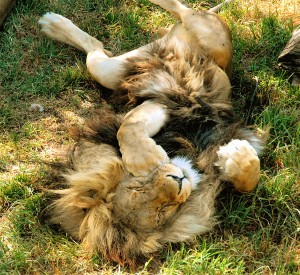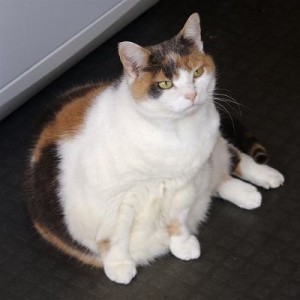When was the last time you saw an obese orangutan? Or a llama with love handles?
Wild animals are experts at keeping in damned good shape without ever forcing themselves to eat less and exercise more. How can they succeed at a chore that most of us find so difficult?
Lazy, Lazy Lions
 The standard explanation is that all animals must work extremely hard to get food that is relatively low in calorie density.
The standard explanation is that all animals must work extremely hard to get food that is relatively low in calorie density.
Bullshit.
Lions lounge for 20 hours a day, with a couple hours to walk around, hunt down dinner, and chow down to their heart’s content on high-calorie zebra meat.
Cue the Barry White Music…
In animals, increases or decreases in the availability of food don’t lead to weight gain or loss, they lead to more or fewer offspring.
In other words, when wild animals have easy access to food, they don’t get fat, they get freaky!
The lack of observed fluctuation in body composition of animals throughout periods of feast and famine suggest that, instead of trying to acquire as big of a caloric surplus as possible, they live in equilibrium with their environment, weathering times of both feast and famine with their health and fitness intact.
Chubby Walruses and Fat Cats
 Yes, some animals, such as walruses, appear to us to be “fat.” But the extra adipose tissue they carry around allow them to thrive in their native environment, which happens to be very cold.
Yes, some animals, such as walruses, appear to us to be “fat.” But the extra adipose tissue they carry around allow them to thrive in their native environment, which happens to be very cold.
In addition, these so-called “fat” animals never exhibit problems with degenerative diseases such as cancer, diabetes, and cardiovascular disease, which pop up whenever we humans become overweight.
The only time you ever see animals that are naturally lean become obese is when they are domesticated, tamed, or live nearby humans and eat what they throw away. (See: the fat cat phenomenon.)
Write This Down…
In their native environments, animals are naturally healthy and fit. Through times of both famine and plenty, they display a remarkable ability to stay at a healthy body composition without ever needing to consciously alter their eating or excercise habits.
The sheer willpower we humans are told to use to eat less and exercise more never comes into play in their case.
When animals get out of shape, it’s due to a change in the environment they have evolved to thrive in, NOT an inherent mechanism to accumulate as much of an energy surplus as possible.
Are Humans the Lone Exception?
And yet, so many people believe that humans are the one exception in the animal kingdom. That we are genetically programmed to be as lazy and gluttonous as possible, and the only way to get lean and fit is to fight nature at every turn for the rest of our lives, cutting calories and exercising like a maniac.
In the next installment on this series on willpower and fitness, I will show you how the conventional wisdom of a “thrifty gene” in humans is completely bogus. Stay tuned!
 I'm a science geek, food lover, and wannabe surfer.
I'm a science geek, food lover, and wannabe surfer.
{ 9 comments }
There’s a lot of this kind of logic in the raw food diet for pets, too. The idea is that in the wild, animals don’t overeat. When they’re not hungry, they don’t just eat for the hell of it like we do.
-Drew
Very good view on using animal health as a basis of how us humans should structure our own eating habits.
Strategies like fasting, paleo nutrition and these sorts get us closer to a real envirnoment not the artifical we like to create … with Big Macs and Chocolate bars!
Raymond
Excellent analysis. Living in equilibrium with our environment is much more difficult now than it was for paleo man. I’m looking forward to how you tie all this together and seeing what recommendations you’ll offer. Keep it coming!
I totally agree with you on this. I think we could use nature as a guide for a lot of things in life. If we would just let nature naturally take it’s course instead of trying to always make things easier, we would be better off. I am all for technological advancements and making things more comfortable, but to a point it has made us as a society fat and lazy. I look forward to reading the rest of your thoughts on this.
-Kelly
Great article,
It makes me wonder what we where like 500 or 1000 years ago.
I know if I don’t keep active, I will start to pack on the pounds!
Bryan C
I was thinking about this last night when I was walking my dog (she’s a doberman). I was noticing how lean she was and it got me thinking. I feed her only twice a day. Don’t really give her any snacks, we walk maybe a mile and a half every day and that’s it. I play with her. BUT, that girl probably sleeps about 18 hours a day. She’s a freakin’ lazy bum!! But, she’s in great shape, is incredibly strong, and isn’t constantly bugging me for food. Her body just does what it does.
@Drew:
Yeah, there is a certain amount of “emotional” or “sensation” eating going on that wasn’t really possible until recently, when food companies were able to start engineering and producing “food” that hits all our buttons for short-term pleasure, even though our bodies don’t know what the hell to do with it once it gets inside of our digestive system.
@Raymond:
Spot on. While no one needs to be obsessed over being 100% Paleo (whatever that even means is up for debate), but rather to understand how our bodies work holistically rather than using inductive reasoning based on cherry-picked (and often flawed) scientific studies.
@Dave:
Yup. The point I’ll make a lot during this series is that it’s our environment we gotta change, not ourselves.
@Kelly:
Thanks, man! Looking forward to providing the goods here. Working with nature is always the easiest way to get what you want. It’s like hitting a patch of ice when you’re driving – you gotta steer into the skid rather than away from it if you’re gonna avoid an accident!
@Bryan:
The shift from “active” jobs such as farming and carpentry to sedentary ones certainly is something to watch out for, but our bodies can usually handle these types of fluctuations without too much change in fat accumulation (losing muscle mass is a different story, however).
@Mike:
Haha. I grew up with golden retrievers, and can definitely say they do their fair share of sleeping and chowing down. They were able to make it through hunting season (when they were really active) and the rest of the year (when they didn’t do a damn thing) without gaining or losing an obvious amount of fat.
Great article. My blog has a lot of the work of Dr. Jeffrey Friedman. The whole bank account model of obesity is wrong.
@Razwell:
Awesome! I haven’t heard about Jeffrey Friedman before, definitely gotta keep an eye on his work in the future.
Comments on this entry are closed.